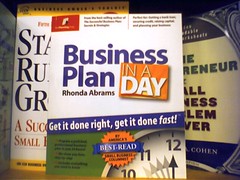 Image by Raymond Yee via Flickr
Image by Raymond Yee via Flickr
A lawyer will seek to aggressively protect their client, including recommending a business form that will provide the best shielding for personal assets. While this is prudent, you should never fall into the illusion that a chosen entity type adequately protects you from potential legal actions. Many attorneys have been successful in proving an entity has not been maintained according to state law and this has exposed the owners personal assets to their complaint. Be aware of the liability protection a business entity can provide; but never depend solely on that. There are two things every business should maintain to protect the owner from liability - a passion for excellence (quality) and insurance. If these are not both built into the heart of any business plan, then there is an argument that the best choice of entity is employee.
Before discussing tax ramifications, there is also an issue the potential Active Investor should consider. It's been said 85% of the workforce are employees, 14% are self-employed, and 1% are business owners. Are you changing from employee to being self-employed or to being an owner? If the goal is to build and own an organization, tax considerations are somewhat different from trying to minimize a self-employed professional's tax exposure. Working out of a normal (C) corporation can create double taxation for the self-employed, which is very undesirable. Some type of "flow through" entity is often recommended. However, if the objective is to build an organization, the funds to grow the business need to come from future company profits. The C corporation has a low (15%) tax rate for it's first tier. This allows the small business to retain some earnings at that low tax rate for growth. If the profits would "flow through" to the owner to avoid double taxation, those funds for growth are effectively taxed at the owner's tax rate. Different intentions create very different tax strategies.
There are many more considerations that need to be considered with an attorney and tax professional. Successful business people often attribute much of their success to having a winning team of trusted advisers who have guided them through these and other issues. However, the secret of the adviser's success is having a client who has thought through what they really want and can give those advisers clear directions.
![Reblog this post [with Zemanta]](http://img.zemanta.com/reblog_e.png?x-id=8016bf83-82ca-4b1a-b783-860097823148)
No comments:
Post a Comment